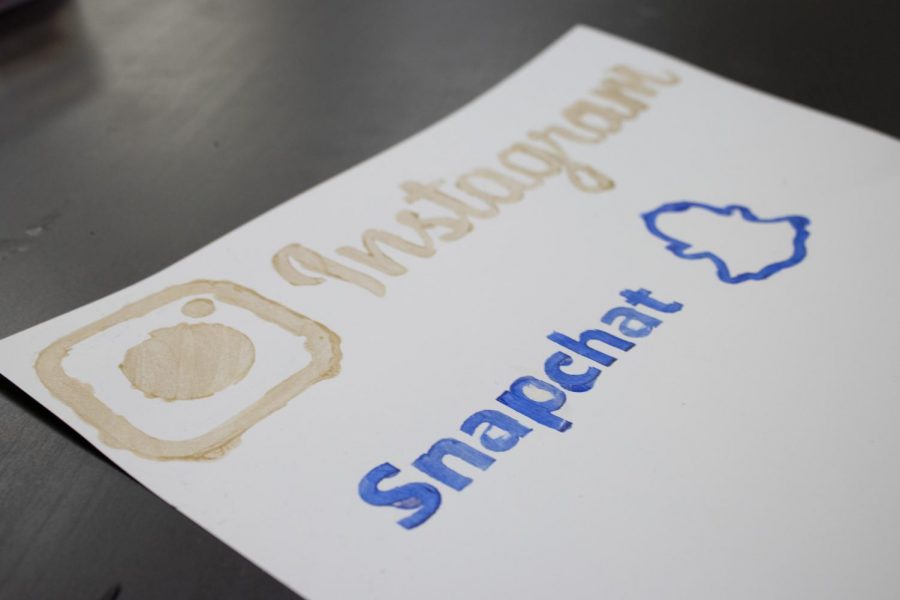Selfies and Self Hatred: How Social Media Is Destroying Our Youth
Researchers have found that youth who spend two or more hours on social media each day are more likely to report poor mental health and psychological distress.
October 27, 2021
If you were given 1,300 hours to do anything you wanted, what would you do?
Given that this is such a long period of time, you might not have a clear idea.
Your first idea probably wouldn’t be to spend all that time on social media, but according to an article by Forbes, Americans spent more than an average of 1,300 hours on social media last year.
To break it down a little better, 1,300 hours per year is about three and a half hours per day. On average, Americans check their phones 262 times a day, with a great deal of that time spent on social media.
In my opinion, spending that much time scrolling through Instagram or Facebook is unhealthy and unnecessary.
To see how those numbers compared to people in my social circle, I placed a poll on my Instagram story asking all my followers how much time they spend on social media each day. Out of 73 respondents, 36 (49 percent) said that they spend about two or three hours on social media. The next highest vote was for an hour and a half or less, with 21 (29 percent) respondents. Both four to five hours and more than six hours received votes from 8 (11 percent) respondents.
Although many consider social media a fun way to stay in the know and connected with friends, it can be a breeding ground for cyberbullying, and induce feelings of anxiety and depression. Research shows that young people who spend two or more hours a day on social media are more likely to report mental health issues and psychological distress.
If this is the case, then why are so many teens addicted to social media?
One big contribution to this problem is that social media apps are programmed to be addictive and keep users on the platform engaged. For example, the infinite scroll feature was created so that when you open Instagram and continue looking at posts, you never reach the end. You are recommended thousands upon thousands of posts that are meant to grab your attention and keep you on the app for as long as possible.
Another way apps keep people hooked is through likes. It is a way of validation; more likes mean more people are interested in what you have to say. By sending a notification to your phone when you receive a like on a post, social media apps continue to suck people into their platforms. Many big companies like Facebook have admitted to changing their app design to increase user engagement, because the longer people are on the app, the more money they make.
According to a survey conducted by the Pew Research Center, 81 percent of teens ages 13-17 say social media helps them feel more connected to their friends. That survey also found that 71 percent of teens say social media makes them feel more included, with only 25 percent saying they feel more excluded.
While this definitely paints social media in a more positive light, it doesn’t tell the full story.
A study conducted by Sarah Coyne, the associate director of the School of Family Life at Brigham Young University, found that girls who started using social media at age thirteen used social media for two or three hours a day, and then increased that use over time, had the highest levels of suicide risk in emerging adulthood. Though this pattern was not found among boys, the study shows how the dangerous effects of social media can affect teenagers.
Another example of how harmful social media is for our health is found in a study published by the Oxford University Press on behalf of the Sleep Research Center. The study followed young adults in the U.S. who frequently used social media 30 minutes before going to bed, and those who rarely or very rarely used social media 30 minutes before going to bed. The study found that there is a clear connection between those who experienced sleep disturbances and had used social media 30 minutes prior to going to bed.
Additionally, a 2014 study found that women who spent 10 minutes scrolling through their Facebook feed were in a more negative mood and felt worse about their bodies than those who looked at a magazine website or an appearance-neutral control website.
The extensive research on social media clearly shows that social media is exceedingly detrimental to mental health, harmful to healthy sleep patterns, and can cause users to view their bodies in a damaging and very negative light.
After taking time to research the effects of social media I have found that the cons heavily outweigh the pros. I encourage you to look at your social media usage and find ways to cut back on it.
As a community, we can all try to be better. The next time you find yourself mindlessly scrolling through Instagram, try to find something more productive and healthy to do. You could bake something, write a letter, or go outside.
If you are someone who communicates with friends solely through social media, consider setting up a time to hang out, where you all put away your phones and have a conversation. It may sound difficult, but this can really help you connect with people and take a break from the constant stress of social media.
Lastly, taking a break from social media altogether is very therapeutic. You might find that everything you felt like you were missing out on wasn’t really that important.
While social media can be a great way to stay connected and share pictures with friends, unrestrained use gives way to feelings of anxiety, body dysmorphia, and loneliness.
Teenagers are spending too much time on social media without realizing the harmful effects. Having an online presence is becoming valued more highly than in person interactions.
Based on the research of numerous studies and articles, social media is severely harming our youth.





